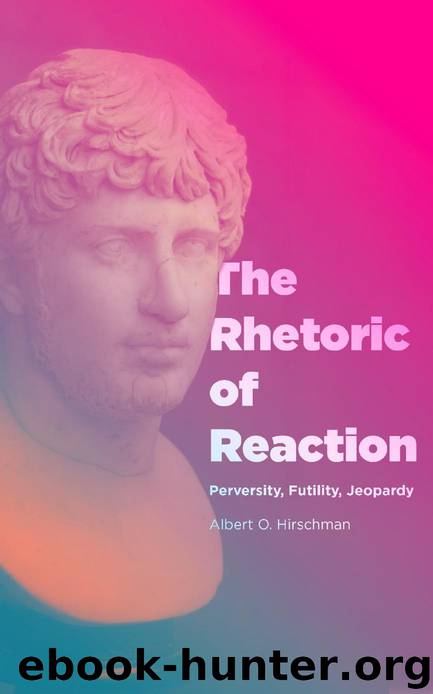The Rhetoric of Reaction by Albert O. Hirschman

Author:Albert O. Hirschman [Hirschman, Albert O.]
Language: eng
Format: epub
Publisher: Belknap Press: An Imprint of Harvard University Press
Published: 1991-01-01T08:00:00+00:00
France and Germany: From Jeopardy to Incompatibility
The battle over the Second Reform Bill is the paradigmatic case for full deployment of the jeopardy thesis in reaction to the spread of the franchise. By the 1860s, according to a wide consensus of public opinion, substantial advances toward a well-ordered, economically progressive, and reasonably “free” society had been made in England, particularly in comparison to other European societies. Hence, it was only natural to worry that the proposed democratization of the vote would endanger those highly prized achievements.
In other countries the situation was then very different and progress from Marshall’s “civil” to his “political” dimension of citizenship much less orderly. The case of France is of particular interest. That country was passing through several revolutions, reactions, and regime changes during much of the nineteenth century, so that individual liberties were far from being securely in place. As a result, the jeopardy thesis lacked plausibility—it is hard to argue that something is threatened when it is not there.
Moreover, universal manhood suffrage did not come to France after a long, drawn-out debate as in England. Rather, suffrage replaced virtually overnight the censitaire system of the July monarchy, during the first exalted days of the 1848 revolution. From then on, universal suffrage was never to be abolished formally. Upon seizing power in 1851, Louis Napoléon actually eliminated some important residence and similar restrictions that had been imposed in 1850 to keep the poorer strata from voting. Throughout his repressive regime he organized plebiscites on the basis of undiluted universal suffrage, thus accrediting the idea that universal suffrage, then often referred to as “democracy,” not only does not go hand in hand with “liberty,” but may well be antithetical to it.
Referring to the shutting down of a newspaper for which he wrote, Prévost-Paradol, a notable liberal of the time, put the matter squarely: “The progress of democracy has nothing to do with the progress of liberty and a society can become ever more democratic without even having a remote idea what a free state is like.”26 No wonder this sentence was prominently (if out of context) quoted by Robert Lowe, in the preface to the collection of his anti-Reform speeches in the House of Commons.
As a result of these historical circumstances, the jeopardy thesis in France tended to take a quite radical shape: it turned into the assertion that democracy and “liberty” are outright incompatible. One origin of this doctrine is probably Benjamin Constant’s famous distinction, mentioned earlier, between the Liberty of the Ancients—the liberty (and obligation) to participate in public affairs—and the Liberty of the Moderns—the right to a broad sphere where one’s private life and affairs can be carried on without interference or meddling on the part of the state. While Constant himself was fully aware of the need to combine these two liberties, the distinction he drew endorsed the notion of two wholly separate domains of liberty whose confusion (by Rousseau first, and then, in his footsteps, by the Jacobins) was alleged to have produced disastrous historical results.
Download
This site does not store any files on its server. We only index and link to content provided by other sites. Please contact the content providers to delete copyright contents if any and email us, we'll remove relevant links or contents immediately.
| Anarchism | Communism & Socialism |
| Conservatism & Liberalism | Democracy |
| Fascism | Libertarianism |
| Nationalism | Radicalism |
| Utopian |
The Secret History by Donna Tartt(19088)
The Social Justice Warrior Handbook by Lisa De Pasquale(12190)
Thirteen Reasons Why by Jay Asher(8909)
This Is How You Lose Her by Junot Diaz(6886)
Weapons of Math Destruction by Cathy O'Neil(6279)
Zero to One by Peter Thiel(5802)
Beartown by Fredrik Backman(5754)
The Myth of the Strong Leader by Archie Brown(5507)
The Fire Next Time by James Baldwin(5444)
How Democracies Die by Steven Levitsky & Daniel Ziblatt(5218)
Promise Me, Dad by Joe Biden(5153)
Stone's Rules by Roger Stone(5087)
A Higher Loyalty: Truth, Lies, and Leadership by James Comey(4963)
100 Deadly Skills by Clint Emerson(4925)
Rise and Kill First by Ronen Bergman(4788)
Secrecy World by Jake Bernstein(4753)
The David Icke Guide to the Global Conspiracy (and how to end it) by David Icke(4718)
The Farm by Tom Rob Smith(4509)
The Doomsday Machine by Daniel Ellsberg(4490)
